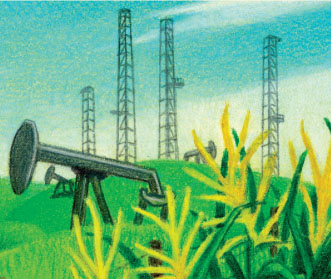 One sector of the energy industry that has received major attention in recent years—very little of it positive—is shale-gas drilling using hydraulic fracturing, or “fracking.”
One sector of the energy industry that has received major attention in recent years—very little of it positive—is shale-gas drilling using hydraulic fracturing, or “fracking.”
But despite the surge of negative PR over the last few years, fracking is not a new concept. “It has been around for years,” notes Robert Rokicki, senior vice president of Oil, Gas, Petrochemical and Chemical Property for Liberty International Underwriters. “The exposures are not that different” from other energy-extraction operations, he adds.
What has changed: Fracking is being used to a greater extent, in more areas—some highly populated—in an effort to extract natural gas and oil from the ground using water and chemicals.
A core of traditional, well-established insurers remains “relatively comfortable” with the risks associated with fracking, says Bertol Olsson, Energy practice leader for North America at Marsh.
Other carriers, Olsson adds, “aren't in it 100 percent”—meaning they will be more selective in the risks they assume and coverages they offer to this industry.
Stuart Anderson, CEO of Iron-Starr, a managing general underwriting agency representing Ironshore Insurance and the CV Starr Group of companies, says the fracking industry presents opportunity for an underwriter with the right knowledge. Iron-Starr has sent some of its underwriters to “shale school” and has met with lawyers and operators in order to grasp the risks of the business.
“There is significant exposure—from the risk of blowout to the risk of 50 trucks fueling around a pipeline at the same time,” says Anderson. “It has to be underwritten closely.”
The issue of experienced personnel has become a concern as fracking expands in the U.S., says Rick Gibbons, president of Zurich Global Energy.
“Millions of jobs are said to be created in the near future and that's good, but who are these people [on the project]?” Gibbons asks. “Are they trained?”
Gibbons also notes that “the supplies [required for fracking] are tremendous.”
Perhaps the biggest insurer concern around fracking is the uncertainty around legislation and potential lawsuits.
Olson observes that insurers are not so much “concerned with the process” of fracking, or the equipment or technology used; their concern centers around “public opinion—litigation and politics,” Olsson says.
“The difficulty is not that drillers are doing something new and dangerous, but that the activity has a higher profile with a more energized environmental lobby,” brokerage Willis says of fracking in a 2012 energy market report.
Indeed, a simple Internet search reveals dozens of litigation cases stemming from the practice and alleged resulting pollution and contamination of water sources.
And with such complex and unresolved issues at play, it is no stretch to come up with scenarios in which it is difficult to conclude whether certain coverage is applied or excluded. And it might be as difficult to predict which jurisdictions lean more favorably toward plaintiffs.
But as with any risk, it's all in the underwriting. The willingness of insurers to write the risks associated with fracking depends on whether those involved in the operations apply best practices to reduce the potential for accidents.
A final note on fracking: Shale gas drilling is not limited to the U.S., says Gibbons of Zurich. There was a recent “huge find” in China, for example, but the infrastructure to start operations doesn't yet exist, he adds.
Want to continue reading?
Become a Free PropertyCasualty360 Digital Reader
Your access to unlimited PropertyCasualty360 content isn’t changing.
Once you are an ALM digital member, you’ll receive:
- Breaking insurance news and analysis, on-site and via our newsletters and custom alerts
- Weekly Insurance Speak podcast featuring exclusive interviews with industry leaders
- Educational webcasts, white papers, and ebooks from industry thought leaders
- Critical converage of the employee benefits and financial advisory markets on our other ALM sites, BenefitsPRO and ThinkAdvisor
Already have an account? Sign In Now
© 2024 ALM Global, LLC, All Rights Reserved. Request academic re-use from www.copyright.com. All other uses, submit a request to [email protected]. For more information visit Asset & Logo Licensing.








